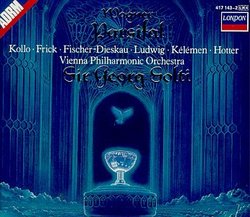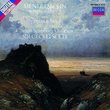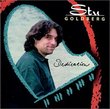| All Artists: Richard Wagner, Sir Georg Solti, René Kollo, Christa Ludwig, Wiener Philharmoniker, Gottlob Frick, Zoltan Kelemen, Dietrich Fischer-Dieskau, Hans Hotter, Birgit Finnilä Title: Wagner - Parsifal / Kollo, Frick, Fischer-Dieskau, Ludwig, Kélémen, Hotter, Wiener Phil., Solti Members Wishing: 1 Total Copies: 0 Label: Polygram Records Release Date: 10/25/1990 Genre: Classical Style: Opera & Classical Vocal Number of Discs: 4 SwapaCD Credits: 4 UPC: 028941714329 |
Search - Richard Wagner, Sir Georg Solti, René Kollo :: Wagner - Parsifal / Kollo, Frick, Fischer-Dieskau, Ludwig, Kélémen, Hotter, Wiener Phil., Solti
 | Richard Wagner, Sir Georg Solti, René Kollo Wagner - Parsifal / Kollo, Frick, Fischer-Dieskau, Ludwig, Kélémen, Hotter, Wiener Phil., Solti Genre: Classical
Wagner coined a blockbuster word to describe Parsifal's genre--Bühnenweihfestspiel, or a "festival play to consecrate the stage." In this, his last work, Wagner returns to the Christian mythology that occupied his ima... more » |
Larger Image |
CD DetailsSynopsis
Amazon.com Wagner coined a blockbuster word to describe Parsifal's genre--Bühnenweihfestspiel, or a "festival play to consecrate the stage." In this, his last work, Wagner returns to the Christian mythology that occupied his imagination earlier in Tannhäuser and Lohengrin. But Parsifal is fundamentally different from the earlier more simplistic, heroic works. Parsifal tries to put the church into the theater, instead of simply giving church themes a theatrical dressing. Parsifal is probably the least accessible Wagnerian opus--the dreamy 19th-century view of Christian mysticism being especially hard for a 20th-century intellect to come to terms with. But those who invest in the effort of understanding the score will be rewarded with a sense of the mystic communion. Though Kollo is sometimes overwrought as the Grail Knight, Fischer-Dieskau is an extremely pitiable and sympathetic Amfortas, and a generally excellent cast carries the day with Frick as Gurnemanz being the highlight. Solti conducts the Wiener Philaharmoniker (Vienna Philharmonic) with mystic solemnity. --Christian C. Rix Similar CDs
|
CD ReviewsOne of Solti's best recordings cdsullivan@massed.net | Cambridge, MA USA | 10/18/2000 (4 out of 5 stars) "Parsifal, Wagner's last masterpiece, has some of the most sublime music he ever wrote, including the "Karfreitagszauber" (Good Friday magic) and the final scene. I have heard three recordings: Barenboim's, Knappertsbusch's (1951), and this Solti. This in almost all respects is a magnificent performance from Solti. He has an ear for balances and textures, bringing out, for instance, the miraculous interweavings of woodwinds, strings and brass in the Prelude. His transitions flow effortlessly, and he gets some glorious, sumptuous playing from the Vienna Philharmonic, first choice for Wagner. Above all, his conducting is more emotional than I have ever heard from him. Instead of either being detatched or only partially involved, he is here totally committed. All the same, the last scene and the Good Friday scene could be the slightest bit more spiritual, which I think has something to do with his tempi. They keep the music moving, which is very important in this work, but very occasionally, I feel like he is rushing a little bit, instead of letting this sublime music flow and unfold. I must stress again, though, that for the most part this is a magnificent reading, and certainly one of the best things he's ever done. He has the best orchestral and choral forces in the world: the Vienna State Opera Chorus, Boys Chorus, and Philharmonic. He is slightly less fortunate with his singers, however. Gottlob Frick portrays Gurnemanz movingly, but he was in his sixties at the time of this recording and is showing his age, wobbling a little bit. Anyway, I'm not sure his voice is very well suited to Gurnemanz. It is quite resonant, but it has a sinister edge - another reviewer said he sounded like a crocodile! (I agree) - which is well suited for Hagen and Hunding but NOT for Gurnemanz, who should have a mellow, beautiful voice. Dietrich Fischer-Dieskau is (yet again!) miscast in a Wagner role (Amfortas). Weren't his Gunther, Wotan (especially that!) and (to a lesser degree) Telramund and Kurwenal enough to make people see his is just not a Wagner voice? Clearly not - he went on to sing Hans Sachs four years after this recording. Here, as usual, his intelligence and sensitivity just can't compensate for a light, lyric baritone. Compare him to George London or the magnificent Hans Hotter in these roles, and the point will immediately be taken. Hotter appears as Titurel; here is the mellowness wanted for Gurnemanz, along with the magnificent volume, resonance and richness of his voice. It must be admitted that he was over sixty at the time of this recording (1972), but I have to say that hearing Hotter in the autumn of his career has never bothered me nearly so much as other people. He has a bit of a wobble, but nothing serious. He and Frick (the older of the two) should have switched roles. Zoltan Kélémen lacks the firm, biting, intensity of voice essential for Klingsor; Hermann Uhde on Knappertsbusch's first recording (Bayreuth 1951), is magnificent. Christa Ludwig, on the other hand, gives us an intense, dramatic yet sumptuously sung Kundry, maybe the best I have heard. René Kollo is Parsifal, and unfortunately, it is he more than anyone else who sinks the set. He is both unsteady and dry of voice. Compare him to the young Wolfgang Windgassen (Kna 1), at his liquid-toned, honeyed peak, and he makes an almost painful contrast. Like the others, though, he is an intelligent singer and makes the most of what he has.My favorite recording of "Parsifal" remains (you guessed it) Knappertsbusch's 1951 Bayreuth account. Despite the mono sound, he A) holds the work's structure together better than anyone; B) reaches ecstatic, spiritual heights in the Good Friday Music and the final scene, and C) has an outstanding cast, including Windgassen, Mödl, Weber, London and Uhde. It is available on Teldec at mid price. If you must have modern sound, he made a later recording (1962) in stereo, with Thomas, Dalis, Hotter, London and Neidlinger, which I have not heard, but sounds extremely promising. But if Knappertsbusch does not convince you, Solti must, and his recording is much easier to find than Knappertbusch's two. Happy listening!" A pleasant surprise Ray Barnes | Surrey, British Columbia Canada | 03/30/2000 (5 out of 5 stars) "After listening to Solti's highly - but effectively - dramatized account of the Ring, this performance comes off as quite an astonishing contrast. To my ears, they would not appear at first to be by the same conductor, but they truly are. Frankly when I purchased this opera in its original LP format some 15 years ago, I did so primarily to enjoy the singing and orchestral playing. It turned out that the conducting was every bit as good as the rest. Needless to say Solti does not overdramatize or drive hard at all, and he does not play this predominantly slow score any slower than necessary. While Hans Knappertsbusch enjoys a formidable repuatation in this opera, I have to rank Solti's performance even higher, as it has better orchestral playing and I think more sensible tempo. Some critics have complained that Solti's recording somehow suffers from a lack of spirituality, without being able to explain exactly why this is so. I find this kind of criticism somewhat esoteric at best and unfair at worst. Speaking only for myself, I found it quite a moving experience. I would rank it alongside the Karajan set. My favourite conductor of all in this music remains Dr. Karl Muck, from the 1920s, but this set, in beautiful stereo, is a strong contender. The orchestral playing is often very beautiful and the singing is generally excellent, although perhaps Rene Kollo in the title role is slightly overparted. The choral singing is absolutely superb and the Vienna Boys Choir deserves special recognition here. Solti conducts with commendable restraint and dedication. There is a particularly moving photo of him hard at work; he appears as though his very soul is on fire. This set is also distinguished by very thoughtful and intelligent commentary, and by tasteful and handsome presentation. All in all, this is a very rewarding issue." PROBABLY THE BEST SUNG PARSIFAL Klingsor Tristan | Suffolk | 08/16/2006 (4 out of 5 stars) "This is the recording that the hero of Simon Gray's play 'Otherwise Engaged' keeps trying to listen to, but keeps getting interrupted before he can get beyond a few bars.
What he would have heard if he'd got to the end would have been perhaps the best sung of all Parsifals. The cast is a starry one (certainly for its time) and they all acquit themselves with more than usual credit. Top of the list belongs to Gottlob Frick singing this Gurnemanz as his swansong to the recording studio. If you think of him only as the pitch black villains of Walkure and Gotterdammerung or the authoritarian rulers of Lohengrin and Tannhauser, think again. This is a warmly wise mature Knight of the Grail whose every word and musical phrase is deeply considered and sung with meaning and understanding. No garrulous old bore, this. Fischer-Dieskau, too, brings all his experience of lieder singing to bear on the text and the music. This Amfortas is no mere cypher, but an honourable, flawed and deeply anguished man. Christa Ludwig presents all the sharply contrasted facets of this profoundly complex character to her portrayal of Kundry. Maybe she lacks just the last volt of electricity generated by Martha Modl in Act 2. The one slightly weak link in this estimable array is Rene Kollo, a rather bland Parsifal with insufficient distinction between the 'reine Tor' who erupts on the scene in Act 1 and the wiser, older, world-weary black knight who trudges into the final Act. A glance down the cast list reveals strength in depth right down to a list of Flowermaidens that includes Kiri te Kanawa and Lucia Popp. As for the conducting, Solti is Solti - exciting, precise, a little hard-driven at times and inclined to be episodic. As always, he draws ravishing sounds from the Vienna Philharmonic and his familiar Decca engineers do him proud by the standards of the day. This is certainly a candidate for a top recommendation Parsifal with its great singing cast and its (relatively) modern sound. Personally, though, I'd go back to the 1951 Knappertsbusch and settle for the more dated sound. " |

 Track Listings (13) - Disc #1
Track Listings (13) - Disc #1

